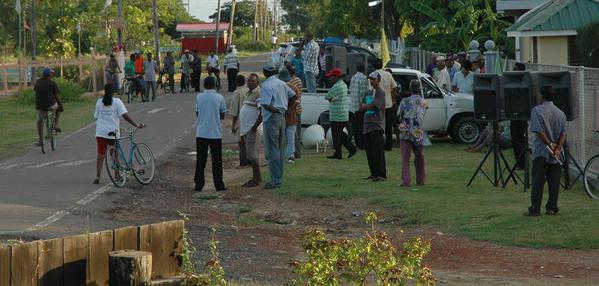AFC kick starts election campaign in Region Nine
- Receives mixed views about possible coalition with APNU
By Abena Rockcliffe
“Constitutional reform is an extreme necessity to Guyana, if former President Jagdeo taught us nothing else, he taught us that all that power should never be given to one human being”- Nigel Hughes
The Alliance For Change (AFC) has turned on its power switch and is now in election campaign mode. The Party, which holds the minority in parliament, has launched its campaign in Region Nine, Upper Takutu-Upper Essequibo.
Campaign activities commenced in the Region on Friday last and the final meeting was held on Tuesday.
The first to hear about the Party’s plans for Region Nine was Lethem.
On Friday, Chairman of the AFC, Nigel Hughes, held a public meeting at Airport Road, Lethem where scores turned out to listen and “gain hope.”
That session was quite interactive as after Hughes delivered his speech, the questions came pouring in.
In his remarks, Hughes highlighted the Region’s failure at CSEC, the pending No-Confidence Motion against the government, the need for constitutional change and the flaws of the Amerindian Act.
A young man questioned whether it was true that the AFC is about to join with A Partnership for National Unity (APNU). He opined, “if so be the case it will secure a landslide victory for the PPP (People’s Progressive Party).
The youth went on, “Young people don’t want that, we feel like both the PPP and the PNC had their chances and screwed it up; we want change, and we want betterment.”
With that argument, the man told Hughes that the worst thing the AFC can do is to come together.
In response, Hughes stated that the AFC has no immediate plans to do so.
But immediately after that answer, another man, this one more mature looking, took the microphone and suggested that the AFC should indeed coalesce with APNU.
His argument was that “Guyana is crying and the only people laughing are those at the top. We all got to fight and we can’t cuff with one hand, we need both hands to cuff. Guyana is very much in need of change”.
He asked Hughes, if not a coalition, what his party intends to do to “change the way we are living.”
Hughes then explained that while a coalition may or may not defeat the government, “what we need is change, constitutional change.”
He said that the actions of former president Bharrat Jagdeo showed clearly that never again can Guyana afford to place so much power in the hands of one human being.
According to Hughes, to see constitutional change is the only reason he entered politics. He said therefore, that the AFC is committed to ensuring constitutional change which, in his belief, will reflect a greater change for Guyana.
The attorney-at-law said, that it must be understood that the AFC holds the balance of power and boasted that the AFC is the only third party in the Region that has been able to attract more votes the second time around as compared to the first time it competed in general elections.
Still answering the question as to why not coalesce, Hughes told the Lethem crowd that it must also be noted that the population still votes through racial lines, as people are seemingly not willing to move away from that unproductive method of electing leaders of the country.
He noted that in 2006 when the AFC placed Afro-Guyanese Raphael Trotman as presidential candidate, it gained more votes in areas populated by Afro Guyanese. But at the last elections when Indo-Guyanese Khemraj Ramjattan was placed as the party’s presidential candidate, the party attracted more votes from the Indo-Guyanese communities.
“So while our strategy is still to be realized, the AFC is committed to securing constitutional change that is what we are sure of.”
Hughes also told Lethem that Region Nine needs a technical school for students who may not want to pursue academics.
In addition to Lethem, the campaign extended to several other villages in the South Rupununi including Maruranau, Shulinab and Baitoon
In the other villages Hughes focused more on letting the residents know what exactly is in the Amerindian Act that is supposed to be “protecting them.” He pointed out the section that says that the Minister of Amerindian Affairs (Pauline Sukhai) can give away traditional lands to investors even if the Toshaos disagree.
The Act stipulates that the first step is to seek permission from the community to have investors utilize but if the Amerindians do not grant permission, the Minister can then sign on their behalf approving which ever activity, be it logging or mining.
The reaction to this varied, but some residents were furious.
Hughes told the communities about the low pass rate in Region Nine and attributed it to the shortage of qualified teachers in the Region. He told them too about the Amerindian Development Fund and explained that the AFC asked the government to account for the money it spent on the Amerindians before more could have been approved.
“If they showed our members of parliament what they did, we would have surely approved the money.”
The main concern in Maruranau was education and the “disturbing” section of the Amerindian Act while Baitoon had a wide range of issues. Residents of the latter community complained about their living conditions, the education offered, “all this talk about budget cut” and their lands.
“We don’t know what the government did with all the money you said parliament gave them, look how we living, but they keep telling us about budget cuts,” one resident lamented
Residents said that all the government has given to the community in recent times is an all-terrain vehicle.
“We had enough, we are ready to stand up and claim our change,” said another resident.
In all the villages visited, Hughes gave out copies of the Constitution and of the Amerindian Act and made other donations.







